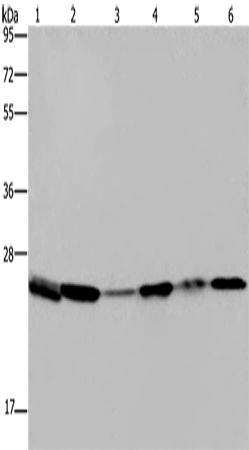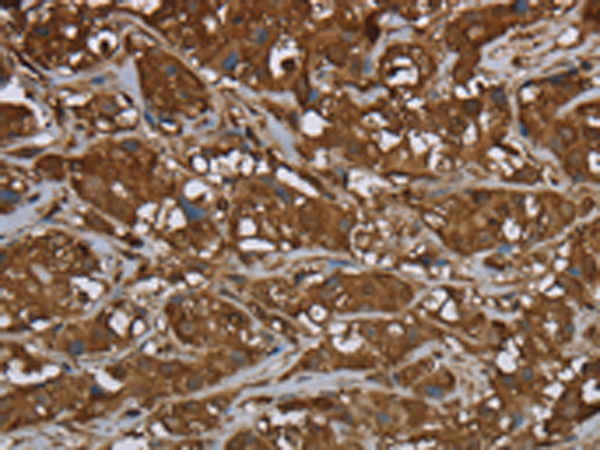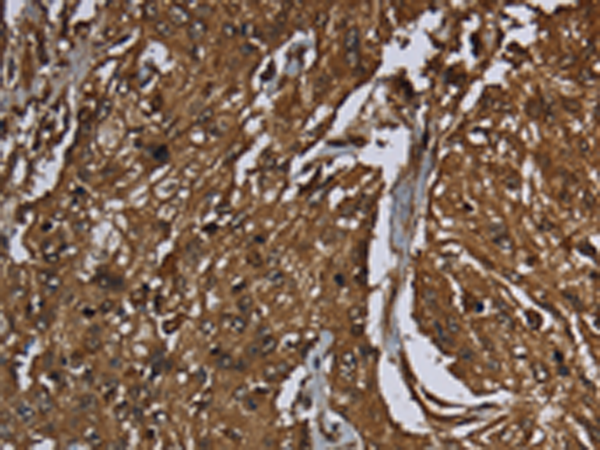


| WB | 咨询技术 | Human,Mouse,Rat |
| IF | 咨询技术 | Human,Mouse,Rat |
| IHC | 1/100-1/300 | Human,Mouse,Rat |
| ICC | 技术咨询 | Human,Mouse,Rat |
| FCM | 咨询技术 | Human,Mouse,Rat |
| Elisa | 1/2000-1/5000 | Human,Mouse,Rat |
| Aliases | GDIA1; NPHS8; RHOGDI; RHOGDI-1; HEL-S-47e |
| WB Predicted band size | 23 kDa |
| Host/Isotype | Rabbit IgG |
| Antibody Type | Primary antibody |
| Storage | Store at 4°C short term. Aliquot and store at -20°C long term. Avoid freeze/thaw cycles. |
| Species Reactivity | Human, Mouse, Rat |
| Immunogen | Fusion protein of human ARHGDIA |
| Formulation | Purified antibody in PBS with 0.05% sodium azide and 50% glycerol. |
+ +
以下是3篇关于ARHGDIA抗体的代表性文献示例(内容基于已有研究领域概括,仅供参考):
1. **文献名称**:*ARHGDIA suppresses tumor progression via inhibition of RhoGTPases in breast cancer*
**作者**:Karlsson MC, et al.
**摘要**:该研究揭示了ARHGDIA在乳腺癌中通过抑制RhoA/ROCK信号通路调控细胞迁移和侵袭,其低表达与患者预后不良相关,提示其作为潜在治疗靶点。
2. **文献名称**:*RhoGDIα stability is regulated by SUMOylation in T lymphocytes*
**作者**:Amado T, et al.
**摘要**:本文探讨ARHGDIA(RhoGDIα)在T细胞活化中的调控机制,发现其SUMO化修饰影响RhoGTPases活性,进而调节免疫突触形成和细胞功能。
3. **文献名称**:*Urinary ARHGDIA as a biomarker of acute kidney injury*
**作者**:Sugimoto K, et al.
**摘要**:研究验证了尿液中的ARHGDIA蛋白作为急性肾损伤(AKI)的生物标志物,其水平升高与肾小管损伤程度相关,具有临床诊断价值。
4. **文献名称**:*RhoGDIα dysfunction in Alzheimer's disease pathogenesis*
**作者**:Huesa G, et al.
**摘要**:该文献提出ARHGDIA异常表达通过扰乱Rho信号通路导致神经元突触功能障碍,可能与阿尔茨海默病的病理进展相关。
**注意**:以上文献为领域内典型研究方向示例,实际引用时建议通过PubMed或Web of Science以“ARHGDIA antibody”或“RhoGDIα”为关键词检索最新文献。
The ARHGDIA antibody is a tool used to detect ARHGDIA (Rho GDP-dissociation inhibitor alpha), a key regulatory protein involved in modulating Rho GTPase activity. Rho GTPases, such as RhoA, Rac1. and Cdc42. act as molecular switches controlling cytoskeletal dynamics, cell adhesion, migration, and signaling pathways. ARHGDIA binds to inactive, GDP-bound Rho GTPases, sequestering them in the cytoplasm and preventing their premature activation. This regulation ensures spatial and temporal control over GTPase signaling, critical for maintaining cellular homeostasis.
ARHGDIA is ubiquitously expressed and implicated in diverse physiological and pathological processes, including cancer progression, immune responses, and neurological disorders. Dysregulation of ARHGDIA has been linked to tumor metastasis, drug resistance, and inflammatory diseases, making it a potential biomarker or therapeutic target.
The ARHGDIA antibody is widely used in research applications like Western blotting, immunohistochemistry, and immunofluorescence to study its expression, localization, and interactions. Researchers employ this antibody to explore mechanisms underlying diseases, such as how ARHGDIA loss enhances Rho GTPase activation, promoting invasiveness in cancer cells. Commercial ARHGDIA antibodies are typically validated for specificity and sensitivity, often targeting epitopes within its conserved N-terminal domain. Understanding ARHGDIA's role through antibody-based studies continues to shed light on its complex regulatory networks in health and disease.
×